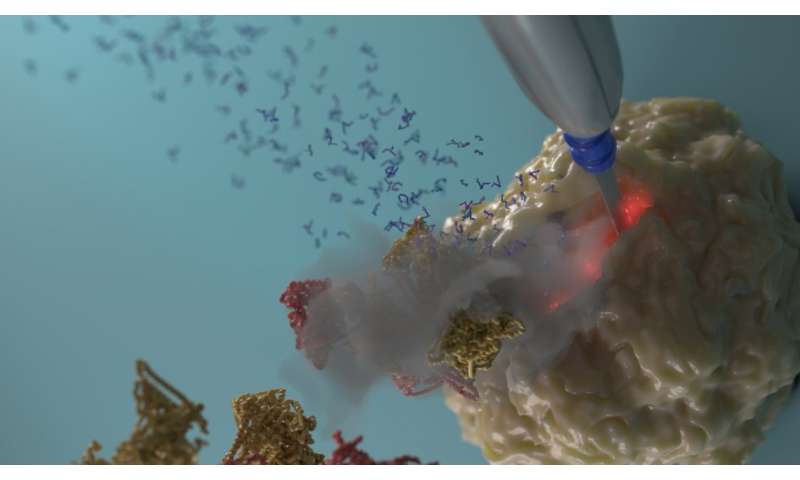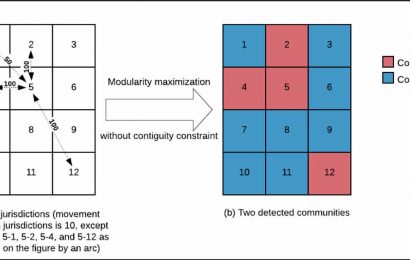
Cancers are often heavily reliant on breaking down fats for their growth and spread, and could be treated by a highly innovative combination of new drugs and dietary changes, a major new study concludes.
The landmark research used a surgical ‘iKnife’ to analyze vaporized cancer tissue—and identified a metabolic weakness in cancer that could be amenable to a new metabolic treatment.
Researchers found that targeting cancer’s ability to process fat using a new class of drugs could halt tumor growth in mice, but only when combined with a diet free of fats.
The study, led by scientists at The Institute of Cancer Research, London, and colleagues at Imperial College London, opens up the possibility of ‘drugs and diet’ cancer treatments—combining precision medicine and dietary changes.
But the researchers stress that the proposed dietary changes would only apply in combination with a specific new class of drugs—and that they are not suggesting they would have any benefit in any other clinical context.
The research also showed the potential for the iKnife to instantly pick out tumors with the metabolic weakness during surgery by analyzing the smoke given off as tissue is burned during excisions.
Looking for ‘metabolic fingerprints’
Scientists looked at cancer cells in the lab and patient-derived tumors to search for ‘metabolic fingerprints’ – chemical patterns left behind by the inner workings of cells.
They used an analytical function connected to the iKnife, which cuts through tissue by rapidly heating it, to sift through the smoke from vaporized tissue for crucial clues about cellular metabolism.
The research was published in Cell.
In the new study, the scientists found that a molecule called PI3K—which is vital to the growth and survival of cancer cells—has a key role in triggering the release of arachidonic acid, a key omega-6 fat.
PI3K is often mutated in many cancers, including breast, gynaecological and bowel cancers.
The researchers found that the mutant form of PI3K sets in motion a chain of events involving another key molecule, cPLA2, which releases arachidonic acid. That in turn fuels the uncontrolled growth and spread of cancer.
A diet free of omega-6 fats
The team then showed in studies in mice that a new class of drugs called cPLA2 inhibitors—which are in clinical trials for the treatment of various inflammatory conditions—could be adapted to treat fat-reliant cancers. But the drugs only worked when combined with dietary changes to restrict consumption of fat.
When mice were treated with a drug that inhibits cPLA2 and also at the same time fed a plant-based, fat-free diet, tumors with mutant PI3K stopped growing and spreading. However, when mice were fed a ‘Western’ diet high in omega-6 fatty acids, the cPLA2 inhibitor was not effective.
The researchers believe that targeting cPLA2 is only effective when there are no dietary sources of arachidonic acid or some other fats to fuel the cancer. In other words, a fat-free, plant-based diet is necessary for these drugs to be effective.
The findings only apply to the use of these experimental cPLA2 inhibitors. They do not imply that the presence of fat could interfere with any existing cancer drugs, nor that the dietary fat restriction alone halts tumor growth.
Detecting tumors with a heavy reliance on fat
The study suggests that arachidonic acid could be a metabolic biomarker—a measurable indicator of the processes going on within cancer cells.
iKnife technology can detect whether tissue is cancerous within seconds during surgery, but this is the first study where it has been used to track the biology of the tumors. It raises the prospect that the iKnife could in future be used during surgery to detect tumors with a heavy reliance on fat, so patients could receive metabolic treatment.
Next, researchers are hoping to test the iKnife approach in a clinical trial to pick out patients who could benefit from being treated with drugs blocking cPLA2 alongside changes in their diet.
Targeting the metabolism of cancer cells
Dr. George Poulogiannis, Leader of the Signalling and Cancer Metabolism Team at The Institute of Cancer Research, London, said:
“We have known for a long time that cancers have genetic weaknesses that can be targeted by treatment, but our study shows that they can also be prone to specific metabolic vulnerabilities.
“We have found that tumors are often heavily reliant on specific fats and their products to fuel their growth and spread, and that denying them the ability to process these could be an effective treatment.
“Our study shows that stopping a specific subtype of cancers from being able to release a key omega-6 fat known as arachidonic acid could be effective as a treatment, but only if sources of this fat are also cut out of the diet. These findings in mice therefore highlight the role of nutrition in the response to the proposed drug therapy.”
“We also show that analyzing cancer’s metabolic fingerprint can be a key tool in understanding, diagnosing and treating the disease. Our research raises the prospect that in future we could analyze cancer’s metabolic fingerprint while patients are on the operating table using the iKnife, and where appropriate match them to a combined drug and diet treatment.”
Professor Paul Workman, chief executive of the Institute of Cancer Research, London, said:
Source: Read Full Article


